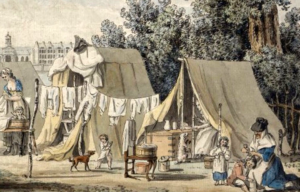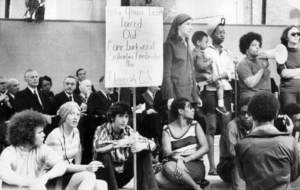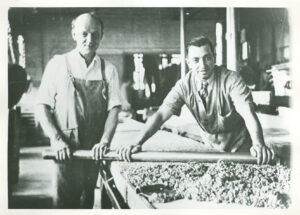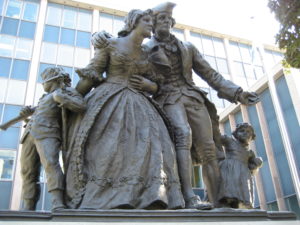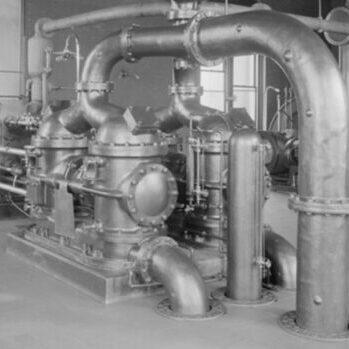
New play at Foundry explores a century-old story of women, work and immigration in Cambridge
The women employed by the Blake & Knowles Steam Pump company in East Cambridge were the subject of controversy and debate in the fall of 1911. These women, many Polish immigrants, toiled alongside men in the foundry making iron cores “with their charred and grimy bodies bared to the waist, in a heat unbearable at times, and for an indefinite number of hours, scarcely able to obtain sufficient time to gulp down a coarse, un-nutritious noonday meal,” according to a report from the American Federation of Labor.
The women had “a task far too taxing for the delicate constitution of a woman,” the AFL said.
There was more at work here than just gendered clichés about women’s abilities.
As part of the wave of new arrivals from Central, Southern and Eastern Europe that began in the late 19th century and continued over the next several decades, Poles took over many of the industrial jobs previously held by immigrants from Britain, Germany, Ireland and Canada. The dual phenomena of a new group of immigrants arriving in Cambridge and the increasing number of women workers in industrial occupations previously occupied by men led many to advocate for limits on the hours and working conditions of laborers, particularly women.
Cambridge newspapers made it clear the Blake & Knowles women were “at times scantily clad,” an idea that scandalized a society shaped by the legacy of Victorian gender norms and horrified by the thought of shirtless women and men laboring next to each other. The articles and AFL report resulted in a public outcry to “protect” the foundry women by passing a bill for the non-employment of women in foundries – though there is no evidence they were forced into the positions.
On the night of Sept. 25, 1911, Gov. Eugene N. Foss declared himself in favor of state police intervention – a raid that would reveal the “unsanitary” working conditions of the iron foundry women of East Cambridge and how their work exceeded the legal limit of 54 hours a week imposed on women workers. The mayor of Cambridge supported this raid, which was likely set in motion because of complaints from male foundry workers who voiced opposition to their female co-workers seeking more hours. Before World War I, there were at most a few hundred men working in the foundry and approximately 25 women.
“Our women are strong, and fully capable of doing the work which is required of them, and the company issues a garment which they wear over the street clothes,” retorted George P. Aborn, general manager of the foundry.
The governor’s investigation ultimately led nowhere, as there was no evidence of laws being violated. Yet, in 1912, Massachusetts passed the Employment of Women in Core Rooms Act, which regulated the structure and location of rooms, the emission of gases and fumes from ovens and the size and weight of equipment women were allowed to lift or work on; and the nation’s first minimum wage law, which applied only to women and children workers, effectively locking them in to low pay without the ability to negotiate.
Designed in 1890 and in operation until 1927, the Blake & Knowles foundry building stands in East Cambridge at 101 Rogers St., by Kendall Square, harkening back to an area of Cambridge filled with heavy industry. In recent years, the building has been refurbished by the Cambridge Redevelopment Authority with the goal of community use; it reopened in 2022 as The Foundry, a space for creative collaboration and programming in science, technology, engineering, the arts and math.
This August, the Foundry Consortium, with a grant from the Mayor’s Summer Youth Employment Program, presents an original play about the Polish women workers, the 1911 raid on the building and the living and working conditions of immigrants in early 20th-century Cambridge. The play is by Foundry board member and teaching artist Betsy Bard and will be choreographed and directed by Allison MacLaury and performed by Cambridge teens. It will explore the stories of these Polish women as workers, as well as their place in their communities and their relationships with family, friends, and neighbors.
History Cambridge is excited to partner with The Foundry and the Summer Youth Employment Program on this project to provide historical background on the experiences of the Polish immigrant community in Cambridge, particularly the lives of the immigrant women workers whose presence alongside men at Blake & Knowles and other industrial settings proved so scandalous to many Cantabrigians a century ago.
Information about The Foundry is here, and History Cambridge will share more about the play on its website as the performance draws closer. We look forward to collaborating with The Foundry to bring this story of women, work and the immigrant experience to life.
Beth Folsom is programs manager for History Cambridge.
This article was originally published in our “Did You Know?” column in Cambridge Day.

